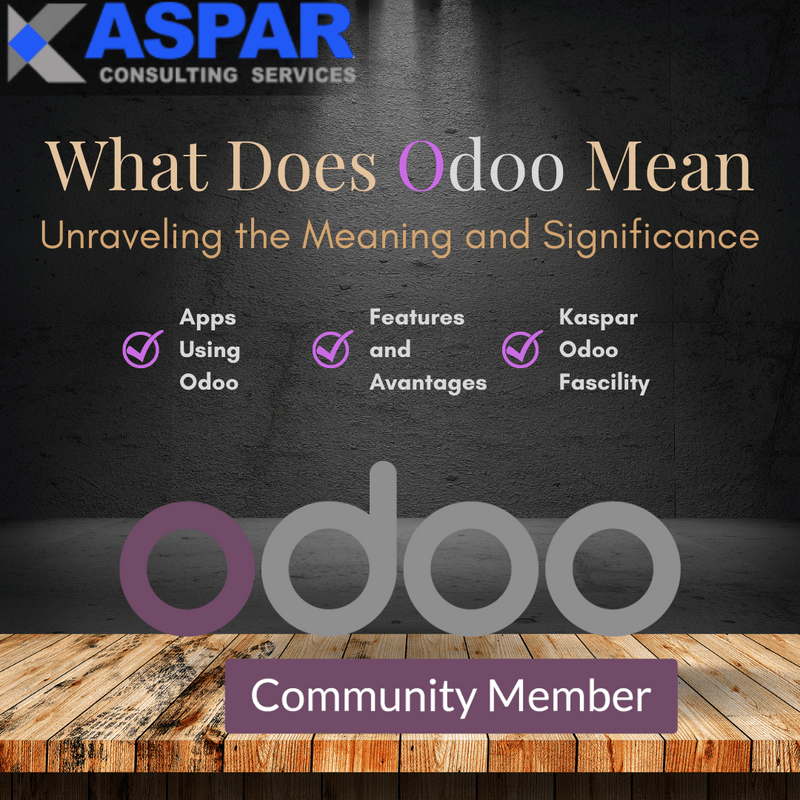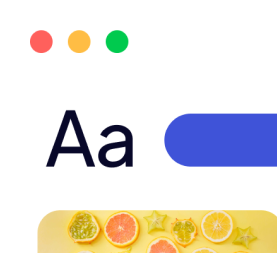- Odoo
- April 22, 2024
- 10 Minutes
What Does Odoo Mean: A Comprehensive Guide To Understanding Odoo


Author
Asim Jibran
Introduction
If you’re involved in the world of business management software, you’ve likely come across the term “Odoo.” But what does Odoo mean exactly? In this comprehensive guide, we will explore the meaning of Odoo, its origins, and its significance in the realm of enterprise resource planning (ERP) systems. So, let’s dive in and unravel the mysteries behind Odoo.
What Does Odoo Mean?
Odoo is a comprehensive suite of open-source business applications designed to streamline and automate various business processes. Originally known as OpenERP, the software was developed by Fabien Pinckaers in 2005. Over time, it has evolved into a powerful ERP platform, offering a wide range of modules and functionalities to businesses of all sizes and industries.
For More Information: https://www.kaspar-consultings.com/blog/what-is-odoo
For More Information: https://www.kaspar-consultings.com/blog/what-is-odoo
The Evolution of Odoo
From TinyERP to Open ERP
In the early stages of its development, Odoo was known as TinyERP. It focused primarily on providing basic ERP capabilities to small businesses. As the software gained popularity and attracted a larger user base, it underwent a transformation and was rebranded as OpenERP. This rebranding marked a significant turning point in Odoo’s journey towards becoming a leading ERP solution.
OpenERPto Odoo
In 2014, OpenERP went through another transformation and reemerged as Odoo. This rebranding was done to reflect the platform’s expanding scope beyond traditional ERP functionalities. Odoo positioned itself as a complete business management suite, offering modules for not just ERP, but also CRM (Customer Relationship Management), e-commerce, project management, inventory management, and more.
Odoo apps for ERP and CRM include:
- Website builder with Odoo CMS (content management system)
- Accounting
- Subscriptions
- Planning
- Consolidation
- Invoicing
- Timesheets
- Inventory management and warehouse management
- Manufacturing MRP
- Field Service
- Marketing, including apps for Marketing Automation, Email Marketing, andSocial media
- eCommerce
- Point of sale
- Helpdesk for customer support
- Project management
- Product Lifecycle Management (PLM)
- Human resources, including apps for Recruitment and Employee Referral
- eLearning
- CRM (customer relationship management)
The Key Features of Odoo
Now that we have a basic understanding ofwhat Odoo means, let’s delve into some of its key features. Odoo is renownedfor its extensive range of modules that cater to various aspects of businessoperations. Here are some notable features of Odoo:
1.Modular Structure
One of the defining characteristics ofOdoo is its modular structure. Users can choose and configure the specificmodules that align with their business needs. This flexibility allows for acustomized and tailored ERP system that caters to the unique requirements ofeach organization.
2.Integration Capabilities
Odoo offers seamless integration betweenits modules, ensuring a unified and connected ecosystem. This integrationeliminates the need for separate software solutions for different businessfunctions, leading to improved efficiency and productivity.
3.User-Friendly Interface
With a user-friendly interface, Odoo makesit easy for both technical and non-technical users to navigate and operate thesystem. The intuitive design and layout contribute to a positive userexperience, reducing the learning curve and enabling swift adoption across theorganization.
4.Extensibility
Odoo’s open-source nature allowsdevelopers to extend and customize the platform according to specific businessrequirements. This extensibility empowers businesses to create tailored solutions that address their unique challenges and gain a competitive edge.
5.Community and Enterprise Editions
Odoo offers both a community edition and an enterprise edition. The community edition is free and open-source, providing access to a wide range of features. The enterprise edition, on the other hand, offers additional functionalities, dedicated support, and service-level agreements (SLAs) for organizations seeking more comprehensive solutions.
1.Modular Structure
One of the defining characteristics ofOdoo is its modular structure. Users can choose and configure the specificmodules that align with their business needs. This flexibility allows for acustomized and tailored ERP system that caters to the unique requirements ofeach organization.
2.Integration Capabilities
Odoo offers seamless integration betweenits modules, ensuring a unified and connected ecosystem. This integrationeliminates the need for separate software solutions for different businessfunctions, leading to improved efficiency and productivity.
3.User-Friendly Interface
With a user-friendly interface, Odoo makesit easy for both technical and non-technical users to navigate and operate thesystem. The intuitive design and layout contribute to a positive userexperience, reducing the learning curve and enabling swift adoption across theorganization.
4.Extensibility
Odoo’s open-source nature allowsdevelopers to extend and customize the platform according to specific businessrequirements. This extensibility empowers businesses to create tailored solutions that address their unique challenges and gain a competitive edge.
5.Community and Enterprise Editions
Odoo offers both a community edition and an enterprise edition. The community edition is free and open-source, providing access to a wide range of features. The enterprise edition, on the other hand, offers additional functionalities, dedicated support, and service-level agreements (SLAs) for organizations seeking more comprehensive solutions.
Primary Advantages of Odoo?
- Low-cost
- Ease of use
- Offers a comprehensive selection of Odoo apps
- Integrates with many third-party add-on software apps
- Offers an Odoo free version called Community
Odoo features include an extensive choice of business apps for many business requirements and industries. Businesses only pay for the apps that they need. For CRM, you can either use the Odoo CRM app or Salesforce. It’s easy to seamlessly integrate Odoo and third-party apps to streamline your business processes for operations, business management, and financial management. For experienced IT developers knowing Python and other computer coding languages, the Community edition is free for the desktop, although it lacks many features included in the Enterprise edition.
Kaspar Offering Odoo
In today’s fast-paced business environment, staying ahead of the competition requires efficient and streamlined operations. This is where Kaspar offering Odoo comes into play. Kaspar, a leading provider of business management software solutions, has revolutionized the way organizations manage their operations. With its comprehensive suite of applications, Odoo offers a holistic approach to business management, covering everything from customer relationship management to accounting and inventory management. In this article, we will delve into the world of Kaspar offering Odoo and explore its key features, benefits, and how it can transform your business.
Kaspar Offering Odoo: Streamlining Business Operations
Kaspar offeringOdoo is a game-changer when it comes to managing various aspects of a business.Whether you run a small startup or a large enterprise, Odoo provides a robustand scalable platform to streamline your operations.
Let’s explore someof the critical areas where Odoo can make a significant impact.
Sales and CRM: Optimizing Customer Relationships
Inventory and Warehouse Management: Ensuring Smooth Operations
Accounting and Finance: Simplifying Financial Management
Human Resources: Streamlining Workforce Management
Website and E-commerce: Expanding Online Presence
Lets Connect
Let’s explore someof the critical areas where Odoo can make a significant impact.
Sales and CRM: Optimizing Customer Relationships
Inventory and Warehouse Management: Ensuring Smooth Operations
Accounting and Finance: Simplifying Financial Management
Human Resources: Streamlining Workforce Management
Website and E-commerce: Expanding Online Presence
Lets Connect
Exploring the Significance of Odo in Different Cultures
Odoo in African Mythology
In African mythology, “odo” holds profound significance. In addition to its meaning as “river” in Yoruba, various African cultures attribute spiritua land metaphysical symbolism to rivers. They are often seen as sacred entities ,representing life, purification, fertility, and the cyclical nature of existence. The concept of “odoo” in these cultures reflects the reverence for the natural world and the belief in the interconnectedness of all things.
Odoo in Traditional Healing Practices
Within the realm of traditional healing practices, “odoo” plays a vital role. In certain cultures, specific scents and aromas are believed to possess healing properties. Aromatherapy, for instance, utilizes the power of essential oils derived from various plants to promote physical and emotional well-being. The use of different scents aims to restore balance, alleviate stress, and enhance overall health.
Odoo in Literature and Poetry
Throughout literary history, writers and poets have utilized the sense of smell and the concept of “odo” to evoke emotions, create vivid imagery, and add depth to their works. From the fragrant descriptions of flowers in romantic poetry to the portrayal of odours in novels, such as the distinct scent of rain or the aroma of a home-cooked meal, the inclusion of “odoo” contributes to a sensory experience for readers.
Businesses Using Odoo
Businesses in many industries use Odoo software.
Odoo ERP with apps fits:
Odoo ERP with apps fits:
- Manufacturing companies
- Distribution companies
- Retailers, including online eCommerce and brick-and-mortar businesses
- Companies with field service operations
- R&D companies
- Service companies
- Marketing Companies
- Training companies
- Consultants and Odoo Partners
- IT companies with trained developers
- Accounting firms.
Unveiling the Intricacies of Odoo in Language and Expression
Idioms and Expressions with Odo
In the realm of language, “odoo” has found its way into various idioms and expressions. These phrases incorporate the term to convey specific meanings or depict certain situations. For example, the word “to follow your nose” encourages trusting your instincts or intuition when making decisions. Additionally, idioms like “to have a nose for something” imply having a keen sense of perception or an innate ability to recognize and understand a particular subject.
Cultural References in Popular Music
The world of music often references the sense of smell and the concept of “odoo” to evoke emotions and create memorable experiences. Songs may incorporate lyrics that describe scents, perfumes, or the essence of a particular environment. The use of olfactory imagery adds another layer of depth to the lyrics, making the listener’s experience more vivid and engaging.
How Much Does Odoo Cost?
The number of users and the Odoo apps chosen for company requirements determine the pricing for Odoo. SaaS standard pricing for Odoo software for business management starts at $35 per month for one user annually or $28 per month before apps, with new customer discounts. Functional business applications comprising the ERP and CRM and Partner implementation services cost extra. An Odoo ERP free version is called the Odoo Community edition.
The Total Guide to Odoo ERP
In this guide, we’ll cover everything you need to know about Odoo ERP integration, including market-fit, pricing, features, and comparisons. The entire corporation uses enterprise resource planning software, like the Odoo ERP system, to handle business activities. Odoo provides practical business applications that may be combined to form an ERP system thanks to its smooth connectivity. The open-source programme, Odoo is available in two editions: Community, which is free, and Enterprise, which has a SaaS subscription fee.
FAQs about Odoo
FAQ1: Is Odoo suitable for small businesses?
Yes, Odoo is well-suited for small businesses due to its modular structure and scalability. Organizations can start with the essential modules and gradually expand their usage as their business grows.
For Latest Trends Please Visit and Follow Us.
For Latest Trends Please Visit and Follow Us.
FAQ2: Can Odoo be used for e-commerce?
Absolutely! Odoo provides a dedicated e-commerce module that allows businesses to create and manage online stores seamlessly. The integration between the e-commerce module and other Odoo functionalities ensures a holistic approach to online business operations.
FAQ3: Is Odoo suitable for large enterprises?
Yes, Odoo’s enterprise edition offers advanced features and dedicated support, making it suitable for large enterprises. The platform’s scalability and customizability enable organizations to tailor Odoo to their complex business requirements.
FAQ4: Is Odoo only available in English?
No, Odoo is a multilingual platform. Itsupports numerous languages, allowing businesses to operate in their preferredlanguage and cater to a global customer base.
FAQ5: Does Odoo have a mobile app?
Yes, Odoo provides a mobile app thatenables users to access and manage their business operations on the go. The appoffers a seamless and intuitive experience, extending the functionality of Odooto mobile devices.
FAQ6: Can Odoo integrate with third-party applications?
Certainly! Odoo offers robust integrationcapabilities, allowing businesses to connect with external systems andapplications. This integration ensures a smooth flow of data and facilitates aconnected ecosystem.
Conclusion
In conclusion, Odoo is a comprehensive and flexible business management suite that empowers organizations to streamline their operations and achieve optimal efficiency. With its modular structure, extensive feature set, and customizable nature, Odoo has become a popular choice for businesses worldwide. Whether you’re a small startup or a large enterprise, Odoo offers the tools and functionalities to drive growth and success. So, now that you understand what Odoo means, it’s time to explore the possibilities it holds for your business. Embrace the power of Odoo and unlock a world of opportunities.




